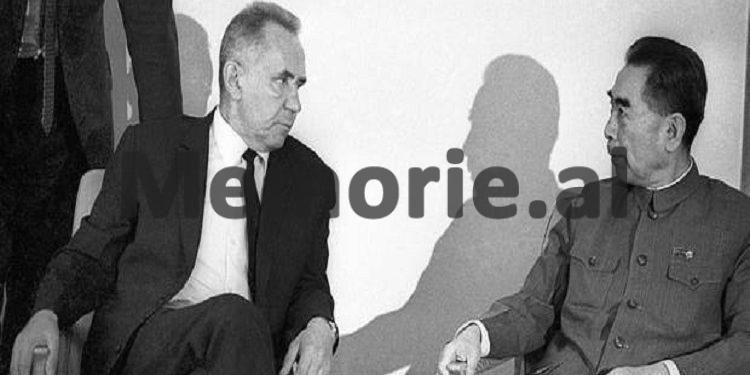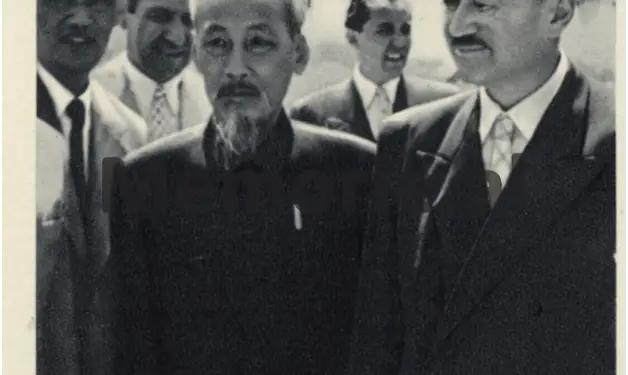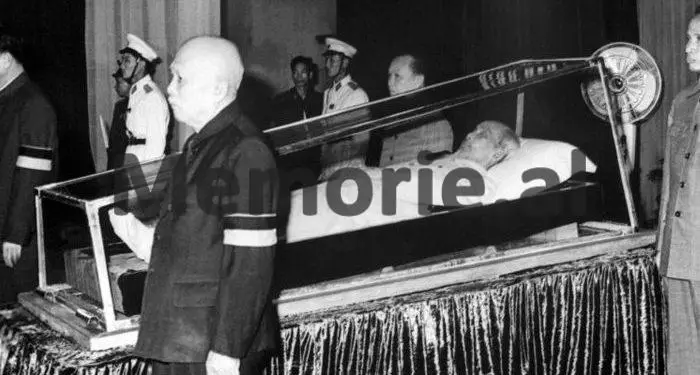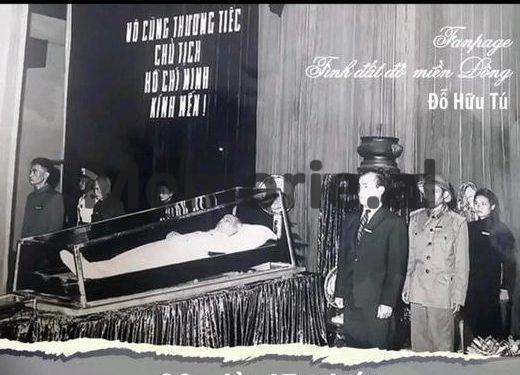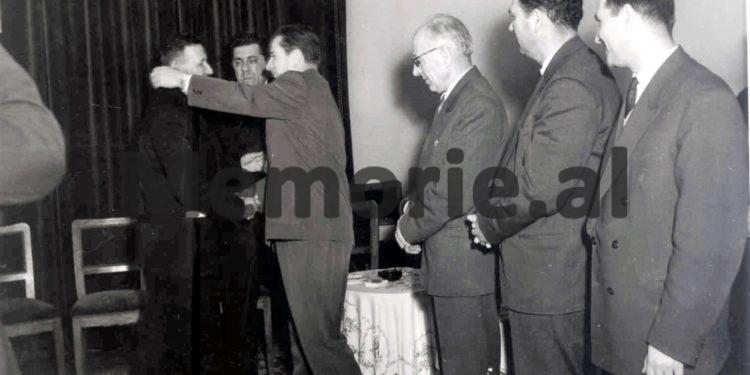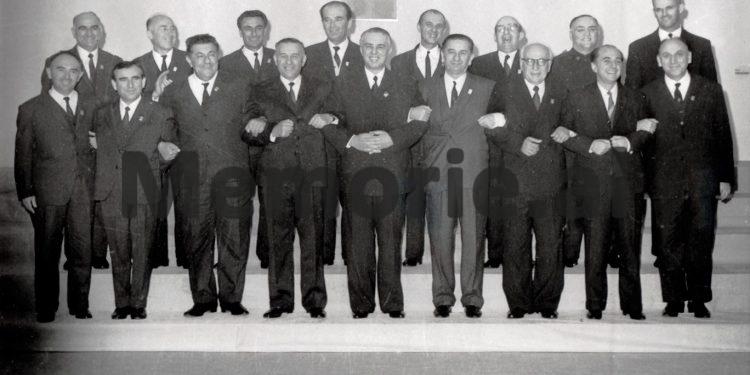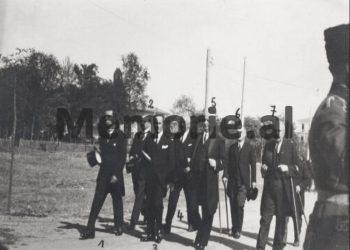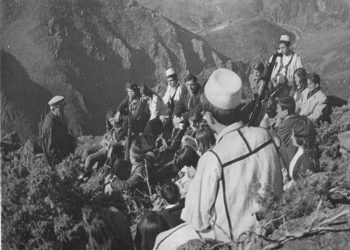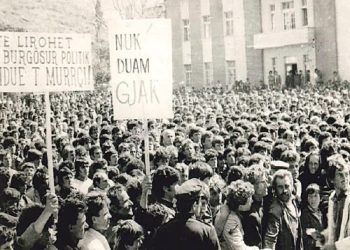Part Two
Memorie.al./ On September 2, 1969, at the age of 79, the Vietnamese communist leader, Ho Chi Minh, passed away. He was known as a communist revolutionary and statesman who served as Prime Minister of Vietnam from 1945–1955, and as President of the Democratic Republic of Vietnam (North Vietnam) from 1955 to 1969. In 1957, while serving as President of Vietnam, Ho Chi Minh also visited Albania, traveling to several districts of the country. Since the breakdown of official relations with the Soviet Union in 1961, the communist regime in Tirana, led by Enver Hoxha, considered Vietnam one of its friendliest and closest states, second only to the People’s Republic of China. Due to this, in September 1969, official Tirana sent a delegation to Vietnam to attend the funeral ceremonies of Ho Chi Minh. The delegation was led by Rita Marko, a member of the Political Bureau of the Central Committee of the Party of Labour of Albania (PPSH), who at the time also held the post of Deputy Chairman of the People’s Assembly of the People’s Republic of Albania, as well as First Secretary of the Party Committee of the Durrës district. Following his return from Vietnam and the People’s Republic of China, where the delegation made a friendly visit, in line with the “Party’s norms and rules,” Rita Marko reported to Enver Hoxha and the other “comrades” of the leadership regarding those visits. This is reflected in the relevant minutes, marked “TOP SECRET,” which Memorie.al is publishing in full in several installments, according to the documents containing the minutes of this meeting, located in the Central State Archive, fund of the former Central Committee of the PPSH.
TOP SECRET
Notes kept during the verbal report given to the First Secretary of the Central Committee of the PPSH, Comrade Enver Hoxha, on September 19, 1969, by Comrade Rita Marko, head of the delegation that visited the Democratic Republic of Vietnam to attend the funeral of President Ho Chi Minh, as well as the visit to the People’s Republic of China.
Comrade Enver invited the following comrades to the meeting to hear Comrade Rita Marko: Mehmet Shehu, Haki Toska, Hysni Kapo, Ramiz Alia, and Xhafer Spahiu. Comrade Enver immediately gave the floor to Comrade Rita Marko.
COMRADE RITA MARKO: The disagreements between them and the leaders of other revisionist countries who do not want war with China are just as serious. With seemingly great difficulty, he said that now that we are discussing these things, Kosygin may have arrived here for talks from Irkutsk, at Beijing Airport.
How is such a thing possible? Who invited him? I intervened. “We don’t know anything,” Kang Sheng interrupted me; “we will have clarity on this issue later, but the Soviets sent us a letter some time ago through our embassy in Moscow, a letter we have not yet responded to. With this letter, they propose that there be talks between the two sides.”
I (Rita Marko) intervened again: “So he left Hanoi, passed through all those countries, and after arriving in the Soviet Union, how is it possible that he is here now?” He said: “We are only mentioning this meeting to you. We will not publish it. Even if you don’t publish it…” I (Rita Marko) interrupted; “you cannot keep it a secret, and the Soviets will publish the information about this meeting.”
It is clear that they kept this a secret from us, considering that Kosygin had started talks with Zhou Enlai at 11:00 at the airport, while we had started lunch at 12:30. When I repeated the question of how such a thing could be possible, Kang Sheng switched to something else, saying that; the Soviets face many difficulties and are therefore forced to seek meetings.
“We should not alleviate these difficulties for them,” I emphasized-“after the occupation of Czechoslovakia, their authority has fallen,” he continued, “and they are heavily propagandizing against China, so we must be vigilant with them.”
COMRADE ENVER HOXHA: Vigilant how? They are strange! With this meeting, they are reaching out to the Soviets. On the one hand, they say the Soviet revisionists have major contradictions in their leadership; on the other hand, they meet with them!
COMRADE RITA MARKO: “Our Central Committee,” he continued, “does not allow us to fall for their provocations and has decided that the disagreements we have with the Soviets on border issues should be resolved through talks. We do not want to go to war for a single day against the Soviets, but this does not depend on us, so we are preparing for war, to be prepared, and we have warned them that we will fight if they bomb our country, our bases. Nevertheless, we support talks with them. We have also had talks with the Americans for a long time.” “But this is not the same thing,” I interrupted, (because) the talks with the Americans are at the ambassador level and have been going on for 14 years, whereas what is happening today here in China is a high-level meeting.”
COMRADE MEHMET SHEHU: How did Kang Sheng react to your interventions?
COMRADE RITA MARKO: He tried to avoid answering, but there was a change from Li Xiannian, although it was understood that he knew everything that was being discussed with Kosygin. Nevertheless, he continued to try to evade my interventions. After he finished speaking about political issues, Kang Sheng said that; Huang Yongsheng, the Chief of General Staff, would speak about military matters.
He was present at the talks and then took the floor, informing us that; “the Soviets are making intensive preparatory efforts along the Chinese border and in Mongolia, where they have so far concentrated 69 divisions, thus adding about 29 divisions in a short period of time. They have also brought about 1,500 aircraft there, increasing their number to 3,000-4,000. They have built new airports and missile bases, and now, they are working intensively on the construction of transport roads. Previously, in the Far East, the Soviets would allow the movement of foreigners via trains. They have already greatly restricted this mode of transport, replacing it with air transport. It is understood that this is due to the preparations and exercises of various armed units that have been built up significantly along the border areas. All these preparations are directed against our country,” he continued. “Border conflicts are ongoing, (and) this clearly shows that the Soviets are preparing to attack China, but we believe that they have not yet completed these preparations; they have not mobilized to the extent necessary to start the war. Within the country, therefore, the Soviet revisionists have major difficulties,” he repeated, as Kang Sheng also said. “They also have difficulties in the international arena, as they have not properly regulated relations with the United States of America and the Federal Republic of Germany, and therefore fear fighting on two fronts. The small border conflicts in which the Soviets are involved at this time might intensify in winter, we think,” said Huang Yongsheng, “but the conditions to start a general war against China are not yet ripe. With the tens of divisions they have gathered, they cannot attack us, because China is not Czechoslovakia.” “However, the possibility that they might make a wrong decision about the war is not excluded, because it is known that in war, there are also things that do not depend on the will of the people,” said the Chinese Chief of General Staff, “but such a decision could cost them dearly.” He later added that; “Nixon also asserted that; the Soviet leadership might make wrong decisions because it lacks military leadership.”
COMRADE MEHMET SHEHU: It is precisely the military leadership that the Soviet revisionists do not lack. The Soviet Union has marshals at the head of the army who are among the most capable of any other army.
COMRADE RITA MARKO: “Guided by Mao’s teachings,” the Chinese Chief of Staff continued, “we are also preparing to withstand a sudden attack by the Soviets against our nuclear bases, either from the ground or an immediate attack in both directions. They might provoke us on the border; they might also attack us from the air. Whatever kind of bombing or attacks the Soviets make against our country, we will consider this a war and will not remain passive, like the Vietnamese. This is why we are working and preparing for the worst-case scenario; if they attack us, we will immediately take the initiative.”
The Chief of Staff then said that; “Kosygin has come here for talks, but we still do not know what he has presented.”
COMRADE ENVER HOXHA: It does not seem possible to me that the Soviet Union has concentrated 70 divisions on the Chinese border; it has a total of 150 divisions, (and) some of them are deployed within the country, (while) there are many divisions in Europe. What about the reserves? You cannot go to war without reserves.
COMRADE MEHMET SHEHU: China cannot be attacked with 70 divisions.
COMRADE RITA MARKO: When the Chief of Staff said that; “we do not know how the talks between Kosygin and Kang Sheng are going,” to fix this, he spoke again, saying that; “if the Chinese had not accepted the talks on their part, the Russians might have lied, saying that we support the talks, but the Chinese do not want them.” I took the opportunity to point out that; “what you are saying is unfounded, that it contradicts what you said earlier. The Soviet revisionists,” I continued, “do everything that can be done against us, including lying, but anyway, we should not make any concessions to them.”1
After this, the Chief of Staff said that; “we are not attacking the Soviets, but if they touch us, we will fight. I had one more thing,” he continued. “According to the information we have, the commanders of the four main regions of the Soviet Union bordering China, with the exception of one, have been replaced. One of them was the deputy commander of the Ra2diotechnical Troops of the Soviet Union.”
Kang Sheng took the floor again and said that; “the Albanian comrades are interested in these issues, so we are telling you these things.” He then added that; “Kosygin’s arrival will not be published, and we are only informing you about it, and that we (the Chinese) will not inform the other sister parties.” It seemed as if the Chinese leaders were very concerned about how they would present this meeting to us.
Kang Sheng then expressed great joy about our successes, noted the work being done in Albania now, on the revolutionization of schools, our experience, etc., and further emphasized that; their ambassador in Tirana has apparently informed them that this year, our agriculture has grown significantly and will meet all the country’s grain needs. He later said additional good things about our party and country.
Finally, on behalf of the Central Committee and the Chinese Government, he communicated the invitation to send an official delegation. “Since we are so busy, we will not have a big celebration. We will not invite others, and for this, we have informed our friends that whoever wants to come is welcome. However, you Albanians need a delegation of any rank, so as close friends as we are; we invite you once again and ask you to inform Comrades Enver Hoxha and Mehmet Shehu about this.”
When Kang Sheng finished, I asked him again what was discussed in this meeting with Kosygin, but he replied that he knew nothing. “However, we are familiar with the situation,” I said. Kang Sheng only said that; “Kosygin asked for it to be published as if he had come to Beijing from Hanoi, not from Irkutsk,” and he ended this discussion here, reasoning that; he was “tired.”
They hosted a dinner at the house where our delegation was staying because Zhou Enlai was coming. They told us that the house had been occupied since the time of the Cultural Revolution, “but now we have reserved it for you.” Kang Sheng, Li Xiannian, and almost everyone else who had greeted us upon arrival at the airport attended the dinner.
Before dinner, they told us that Zhou Enlai had been very busy, but in fact, as he told us himself, he had slept that afternoon. I mention this because we tried three times to meet with friends from our embassy in Beijing, but they turned us away, saying that Zhou Enlai would come to meet us, but he did not, for the reason I explained.
At dinner, Zhou Enlai started the conversation by telling us that we would also visit Nanjing; “where I had talks with Chiang Kai-shek and you will see the bridge there.” Later, when we were served pork, I did not like to eat it, so I did not serve myself any. “You don’t eat it,” said Zhou Enlai. “No,” I said, “I am eating it, but today I am very full and cannot eat.”
“While I eat a lot of it,” said Zhou Enlai, “and he opened the conversation with a discussion about pork, to later lead it to Kosygin. He told Kang Sheng that; “the Soviets have accused us (the Chinese) of violating pork supply contracts and that we have created difficulties for them regarding this, etc., etc.”
I told him that; “the Soviet revisionists were the first to break the contracts, the first to always level accusations against us, and the Soviet revisionists are used to doing things all the time against all those who do not do their duty. In fact, Kosygin, Brezhnev, and the other Soviet revisionist leaders, as well as all their comrades everywhere, are ready to do anything against those who do not follow their path.”
Thus, Zhou Enlai deliberately opened the conversation with the discussion about pork, just to start it. Then, he explained that the Soviets also accuse the Chinese of not supplying timber, but Zhou Enlai emphasized that; “we have not violated any of their contracts; on the contrary, they are the ones who have violated them. For this reason, we have not signed any new contracts with them since then, nor this year.”
I took the opportunity to tell them our point of view, saying that; we did not break with them because of pork, but there are deeper issues, very important issues between us, as we know. Throughout the dinner conversation, Zhou Enlai spoke loudly.
COMRADE MEHMET SHEHU: Zhou Enlai did not say anything about how and why Kosygin came to China?
COMRADE RITA MARKO: He did not give us a proper overview, and everything I am conveying, he shared one thing after another, unsystematically. I told them that; “you yourselves know that the Soviet revisionists are capable of doing everything against us, much less violating contracts or withdrawing specialists from our countries. This is why I do not find the meeting you had with Kosygin suitable.”
Then Zhou Enlai jumped up and said; “we have also talked with the United States for 14 years.” I mentioned it again that; “in my personal opinion, I do not think it is wise that you met with Kosygin for these issues, for which another path could have been found.”
“You are too extremist,” he told me with a hurt look on his face. I asked the translator to repeat these words to me once more, to make sure I had not misunderstood, and after the translator confirmed he had made no mistake, I replied to Zhou Enlai that; “I am not an extremist, but a revolutionary, and I speak openly.”
He immediately turned to Kang Sheng with the words: “How then should Stalin’s meeting with Ribbentrop be explained?! We have talked with the United States for 14 years; perhaps we have made concessions to the Americans during this time?!”
I intervened again and told him that; “when you were in Tirana, you told us that you appointed a third-rank person to talk with the Americans, a person who does nothing, and then in this concrete situation, I do not think your meeting with Kosygin serves us.”
“Were the Soviet leaders perhaps less fascist than the Germans when Stalin met with them?!” asked Zhou Enlai. It was clear that he was very hurt. “No one is saying that,” I replied. It is worth noting that during this dinner, which he hosted, he did not raise a single toast to us. Memorie.al




